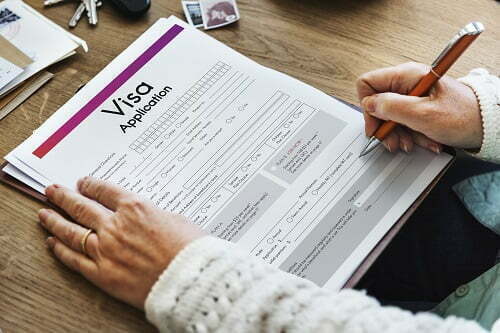Table of Contents
- Requirements for a student visa to study in Germany
- Types of student visas to study in Germany
- Germany student visa requirements
- How to apply for a student visa in Germany?
- When to apply for a German student visa?
- How much financial resource proof do I need for a German student visa?
- How much time does processing take?
- Can I work in Germany if I have a student visa?
- What’s next?
Germany is a popular destination for international students, with the number of students applying for a student visa to Germany growing each year. Why? Germany is one of the most affordable countries for studying abroad.
Tuition fees are exempt in German public universities. Moreover, with more than 1300 master’s degree courses taught in English, the country does not pose language barriers and restrictions.
Requirements for a student visa to study in Germany

If you want to study in Germany, and you hail from India, you need a student visa for Germany from India. However, there are certain prerequisites you first need to fulfill.
For students who want to pursue:
- Any course of 3 months should get – a Schengen Visa.
- Over 3 months should get – the German National Visa.
Students entering Germany with a national visa have to extend their stay with a resident permit in Germany for higher education from the Foreign Office. This is to be done when the entry visa is valid.
To study in the country as a foreign student, there are different types of German student visas. Which visa you need to apply for will depend on your course and the duration of your program. Let’s take a look at the different types of student visas to Germany you can apply for.
Types of student visas to study in Germany

Students may be granted German visas to study different degrees and levels, such as undergraduate, graduate, postgraduate studies, and exchange programs. This would also cover participation in pre-academic or non-academic courses in the German language.
Germany student visa requirements for Indian students may vary depending on the nature of travel to the country.
- Student Visa for Germany: The standard student visa in Germany for all international students who have graduated (or will soon be graduating) from an accredited university and are ready to begin a full-time program at a German university.
- Applicant Visa for Students in Germany: This visa is for students who want to stay in Germany and apply for a university program in person. However, this visa does not allow an applicant to study in the country and is only valid during the process of a university application.
- Visa for Language Course: Students need this visa to take up a language program in Germany.
Germany student visa requirements
The general German student visa requirements and their most important criteria are given below-
German student visa document requirements
- Duly filled and signed application form for a national visa.
- Valid passport.
- Passport photocopies (2).
- Birth certificate.
- Marriage certificate (if applicable).
- Child’s birth certificate (if applicable).
- Passport-style photograph (3).
- Photocopies of titles of German residence (if applicable).
Financial proof (Finanzierungsnachweis) (any one)
- ⚬10,332 deposit confirmation at a blocked German account.
- Letter of evidence along with commitment of income record of parents with financial assets.
- A letter of commitment from a valid German resident, or Verpflichtungserklarung. The Alien’s Registration Office releases this letter to the German resident who covers the cost of studies.
- Scholarship certificate covering the cost of the course fee.
- Bank guarantee from a reputed bank in Germany.
University admission proof
- Admission confirmation (Zulassungsbescheid) from a recognized university or institution in Germany, depicting when the course starts and the language of instruction.
- Conditional admission proof (BedingterZulassungsbescheid) and confirmation of intensive course or Intensiv-Sprachkurs. In addition, the letter should also show that you are confirmed to be a part of the intensive language program before securing admission. The course should last for at least 6 months, and should have 18-hour lessons per week.
- Conditional University Admission Proof: “uni-assist” letter, admission confirmation as an applicant, communication with university, for the final admission.
- Proof of payment for language courses with a secure place in that course. Payment should cover three months at least.
- Admission confirmation in university preparatory courses (Studienkolleg).
- Uni-assist letter.
- Admission confirmation as an applicant.
- Correspondence with the college/university, regarding the terms for admission.
- Proof of confirmation of enrollment.
- Evidence of previous education.
- School leaving certificate (original).
- Degree certificate (if enrolling for Ph.D. and Master’s courses).
- Student’s health insurance.
- University entrance qualifications.
- Certificate of English (IELTS or TOEFL) or German language proficiency.
Read more about the 10 best countries to study abroad and work
How to apply for a student visa in Germany?

The application process for a German student visa can be confusing for international students as the process varies from one country to another.
Here are the key steps you need to follow in order to secure a student visa for Germany:
- Locate the nearest German Consulate or Embassy.
- Review the German student visa procedures and requirements.
- Set up an appointment for a visa.
- Prepare all documents related to the visa application.
- Prepare for the visa interview.
When to apply for a German student visa?
After receiving the admission letter from the university and securing funds to study and stay in Germany, one can apply for a student visa for Germany from India. But remember, the letter is a key requirement, and if a student has not been awarded an official scholarship, they will need financial resource proof like money deposited in the German blocked account.
How much financial resource proof do I need for a German student visa?
The amount of money required in the blocked bank account prior to the German student visa application is ⚬10,332.
How much time does processing take?
It takes less than a month to process the application for a German student visa. To be exact, you may have to wait for up to 25 days for the visa. However, the time for processing varies based on the German consulate or embassy you apply to and the country where you’re from.
All the other types of German student visa applications are generally processed in less than 3 months.
Can I work in Germany if I have a student visa?

Any student visa holder can legally work in Germany. However, students have restrictions on the number of working days – 120 days full working or 240 days half working. Moreover, EU students can work for 20 hours a week without a work permit.
If a student wants to live in Germany and work post the degree, those holding a residence permit may extend it. They can stay for at least 18 months after graduation, as long as their work is related to the field.
What’s next?
- Since the German student visa requirements are straightforward, any student from anywhere in the world can seek admission to a reputed university in Germany.
- If you are planning to apply for a German student visa, start at the earliest and make sure every single document is in place.
- With an array of choices for higher education in Germany, including language courses and more, there’s a whole range of universities and colleges you can apply to.
- Now that you have an in-depth understanding of the German student visa requirements you need to fulfill and how to apply for the visa, go ahead! Apply for it.
And if you feel like we’ve missed out on something or have any doubts, feel free to reach out to us or drop a comment below.
We’d be happy to help!
Read more about 100 graduate schools with low GPA requirements






